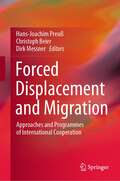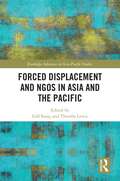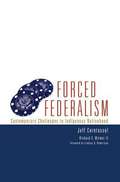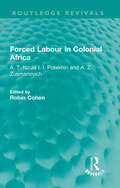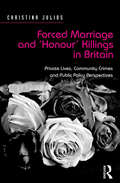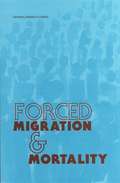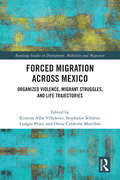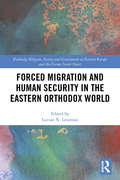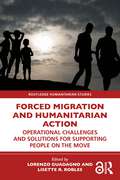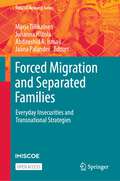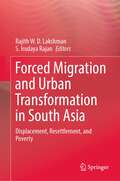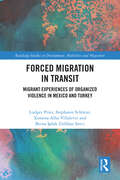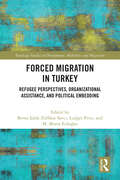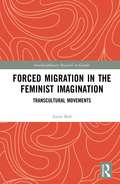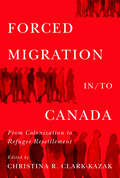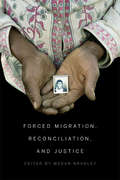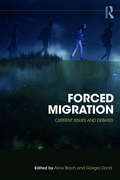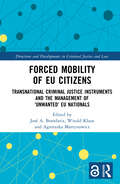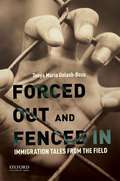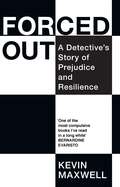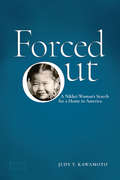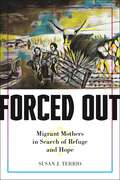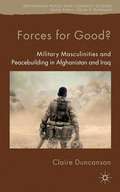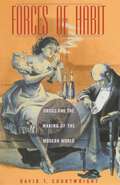- Table View
- List View
Forced Displacement and Migration: Approaches and Programmes of International Cooperation
by Christoph Beier Dirk Messner Hans-Joachim PreußThis book presents effective long-term solutions for displacement and migration against the background of the current debates. It offers insights on practical suggestions for dealing with displacement and migration due to violence, examines ideas for the management of global migration movements and looks into the integration of refugees and migrants. Throughout the chapters, experts from science, politics and practice shed light on the causes of global migration and the consequences of migration on a political, economic and social level. The focus of the discussion is not the avoidance of migratory movements, but above all the use of positive effects in countries of origin, transit and destination.The book is a must-read for researchers, policy-makers and politicians, interested in international cooperation and in a better understanding of causes, consequences and solutions of displacement and forced migration.
Forced Displacement and NGOs in Asia and the Pacific (Routledge Advances in Asia-Pacific Studies)
by Gül İnançThis volume presents a comprehensive survey of the dynamics of conflict and climate induced forced displacement and organisational response across Asia and the Pacific. The Asia Pacific region hosts some of the largest numbers of displaced people on the planet, with some of the fewest protections available and sparse frameworks for advancing rights, livelihood, and policy. The region maintains the lowest number of signatory states to international refugee protection covenants, and the majority of national protection and support systems are ad hoc, precarious, and unpredictable. Civil society has very often filled in the gaps but, with the rise of nationalist rhetoric, civil society space has been shrinking. Drawing upon the expertise of academics, practitioners, historians, theorists, policy makers, political scientists, economists, and the voices of affected communities across the region, this book examines both key case studies and larger regional trends. This book is a valuable resource for scholars and practitioners looking to understand the complexities of responses to refugees and forced migrants in the Asia Pacific Region.
Forced Federalism: Contemporary Challenges to Indigenous Nationhood (American Indian Law and Policy Series Volume #3)
by Jeff Corntassel Richard C. WitmerOver the past twenty years, American Indian policy has shifted from self-determination to “forced federalism,” as indigenous nations in the United States have encountered new threats from state and local governments over such issues as taxation, gaming, and homeland security. During the forced federalism era (1988–present), public perceptions of indigenous peoples as “rich Indians” have been just as damaging to Native nations as anti-sovereignty legislation. This book examines how state governments have manipulated “rich Indian” images when setting policies targeting indigenous peoples and discusses how indigenous nations have responded politically to these contemporary threats to their nationhood. Drawing on original survey data collected from Native governments from 1994 to 2000 and on interviews with Chief Chad Smith of the Cherokee Nation as well as other indigenous leaders, Jeff Corntassel and Richard C. Witmer II examine the power dynamics of the indigenous-state compacting system, and show how electoral activism among indigenous peoples has increased their political power while also giving rise to “rich Indian racism” among non-Indians—especially in the wake of the Indian Gaming and Regulatory Act. The authors warn that current widespread Native participation in non-Native politics is undermining both the political and the cultural foundations of indigenous nationhood, especially as the American culture of money gains influence in Native politics. They also offer specific strategies for regenerating indigenous communities in order to meet future challenges to their nationhood.
Forced Labour in Colonial Africa: A. T. Nzula I. I. Potekhin and A. Z. Zusmanovich (Routledge Revivals)
by Robin Cohen Hugh Jenkins A. T. Nzula I. I. Potekhin A. Z. ZusmanovichOriginally published for the first time in English in 1979 this book represents one of the earliest Marxist analyses of the impact that colonialism had on Africa during the first half century that followed the Scramble. Nzula’s co-authored book, together with all his writings in the Negro Worker, are assembled here. The political experience of its African co-author resulted in a book which is alight with commitment to the liberation of the Continent, yet always tempered by an explicit theoretical understanding of capitalism in its imperialist phase. The book opens with an outline of Africa’s role in the world economic system. Successive chapters reveal how Western capitalism conjured up a brutally exploited working class and dispossessed peasantry throughout the African continent. Each major region of Black Africa is analysed. Meticulous information as to the facts of oppression and many of the early urban and rural struggles against colonialism before the Second World War is set out. Robin Cohen’s introduction is a valuable summation of Nzula’s life and of the background to this book. The appendices bring together many of Nzula’s little known writings.
Forced Marriage and 'Honour' Killings in Britain: Private Lives, Community Crimes and Public Policy Perspectives
by Christina JuliosThis book explores the contemporary phenomenon of forced marriage and 'honour' killings in Britain. Set against a background of increasing 'honour'-based violence within the country's South Asian and Muslim Diasporas, the book traces the development of the 'honour' question over the past two decades. It accordingly witnesses unprecedented changes in public awareness and government policy including ground-breaking 'honour'-specific legislation and the criminalisation of forced marriage. All of which makes Britain an important context for the study of this now indigenous and self-perpetuating social problem. In considering the scale of the challenge and its underlying causes, attention is paid to the intersections of gendered power structures that disadvantage female members of 'honour' cultures as well as feminist theories that seek to explain them. The book features five key case-studies of 'honour' killings and draws from a wide range of narratives including those of 'honour' violence survivors, grassroots service providers and legislators. Such myriad of perspectives reveals the complexity of the 'honour' issue and the deep ideological divisions that characterise it. With the UK's multiculturalist discourse unable to reconcile protecting patriarchal minority cultures with safeguarding gender equality and human rights, the book raises fundamental questions about the country's future direction. Following a long trend of state-sponsored integrationist policies, the government's response to the 'honour' question points decisively in the direction of a post-multicultural British nation.
Forced Migration & Mortality
by National Research CouncilPapers from a November 1999 workshop on mortality patterns in complex emergencies, organized by the Roundtable on the Demography of Forced Migration, and held in Washington, D. C. , overview the state of knowledge about mortality in past complex humanitarian emergencies. Case studies on Rwanda, North Korea, and Kosovo, commissioned for the workshop, and on Cambodia, added after the workshop, reflect on emergencies involving forced migration. Other regions discussed include China, Bosnia, Sierra Leone, and Afghanistan. Annotation c. Book News, Inc. , Portland, OR (booknews. com)
Forced Migration across Mexico: Organized Violence, Migrant Struggles, and Life Trajectories (Routledge Studies in Development, Mobilities and Migration)
by Ludger Pries Stephanie Schütze Ximena Alba Villalever Oscar Calderón MorillónThis book analyzes the different ways in which forced migration comes together with organized violence in the Americas, focusing specifically on the migration corridor from Central America, through Mexico and on to the United States. No matter their starting point, most South and Central American migrants to the United States must eventually traverse Mexico, and often many other borders beforehand, to reach their destination. As border controls tighten, for many migrants turning back is not a possibility, or something they desire. And so, when faced with hardening policies, migrants are often forced into situations of increased violence and precarity, without a shift in their ultimate objective. This book analyzes the complex social situations of everyday violence, and increasingly aggressive border controls, which face migrants in Mexico, as well as their exposure to a different kind of violence during their migration trajectory through the criminal actors such as gangs, cartels, and corrupt law enforcements that seek to make a profit from them. The book takes a critical approach on migration policies and on the externalization of borders by analyzing their effects on the trajectories and experiences of migrants themselves. It shows that the more migrants’ opportunities and rights during transit are hindered, the more they are at risk of exposure to these actors. Foregrounding the voices of migrants, this book offers fresh insights into debates surrounding migration, politics, international relations, and anthropology in the Americas.
Forced Migration and Human Security in the Eastern Orthodox World (Routledge Religion, Society and Government in Eastern Europe and the Former Soviet States)
by Lucian N. LeusteanThe conflict in Eastern Ukraine and the European refugee crisis have led to a dramatic increase in forced displacement across Europe. Fleeing war and violence, millions of refugees and internally displaced people face the social and political cultures of the predominantly Christian Orthodox countries in the post-Soviet space and Southeastern Europe. This book examines the ambivalence of Orthodox churches and other religious communities, some of which have provided support to migrants and displaced populations while others have condemned their arrival. How have religious communities and state institutions engaged with forced migration? How has forced migration impacted upon religious practices, values and political structures in the region? In which ways do Orthodox churches promote human security in relation to violence and ‘the other’? The book explores these questions by bringing together an international team of scholars to examine extensive material in the former Soviet states (Ukraine, Russia, Georgia and Belarus), Southeastern Europe (Turkey, Greece, Serbia, Bulgaria and Romania), Western Europe and the United States.
Forced Migration and Humanitarian Action: Operational Challenges and Solutions for Supporting People on the Move (Routledge Humanitarian Studies)
by Lorenzo Guadagno Lisette R. RoblesForced population movements are a defining feature of almost any humanitarian crisis, shaping the design, targeting, and delivery of emergency responses.This book investigates how the evolving situation of different forced migrants is accounted for and addressed in humanitarian action in order to improve their access to support and assistance. Bringing together case studies from Africa, Asia, Europe, and the Pacific, this book focuses on a diversity of operational modalities and types of assistance provided by both traditional and non-traditional humanitarian actors to address the specific needs of displaced children, women, people with disabilities and older people, as well as trafficked migrant workers.This book adopts a broad perspective on humanitarian action, acknowledging how its boundaries are challenged and expanded in forced migration contexts. Its operational and theoretical insights will be useful for a range of readers, from humanitarian and migration researchers and students to practitioners and policymakers.
Forced Migration and Separated Families: Everyday Insecurities and Transnational Strategies (IMISCOE Research Series)
by Marja Tiilikainen Johanna Hiitola Abdirashid A. Ismail Jaana PalanderThis open access book examines the impacts and experiences of family separation on forced migrants and their transnational families. On the one hand, it investigates how people with a forced migration background in Europe, the Middle East, and Latin America experience separation from their families, and on the other, how family and kin in the countries of origin or transit are impacted by the often precarious circumstances of their family members in receiving countries. In particular, this book provides new knowledge on the nexus between transnational family separation, forced migration, and everyday (in)security. Additionally, it yields comparative information for assessing the impacts of relevant legislation and administrative practice in a number of national contexts. Based on rich empirical data, including unique cases about South-South migration, the findings in this book are highly relevant to academics in migration and refugee studies as well as policy-makers, legislators and practitioners.
Forced Migration and Urban Transformation in South Asia: Displacement, Resettlement, and Poverty
by S. Irudaya Rajan Rajith W. D. LakshmanThis book discusses the displacement of urban populations, inequality, and poverty in three cities in South Asia—Colombo, Jaffna in Sri Lanka, and Kochi in India. It focuses on the long-term effect resettlement and relocation has on the lives and livelihoods of urban internal displacement of populations (IDPs) primarily from urban poor classes. It also discusses the concerns faced by the displacement in post-war Sri Lanka. It examines the impacts of conflict on poverty and recovery in peri-urban settings. It emphasizes the role of agency of urban IDPs in strengthening their own well-being. It draws attention to how the agency of urban IDPs is compromised by the displacement processes and the weak local level governance structures in the cities. The book is intended for researchers, graduate students, and teachers of Geography, Social Policy, Refugees and Migration Studies, History, International Development, Urban Studies, and South Asian Studies.
Forced Migration in Transit: Migrant Experiences of Organized Violence in Mexico and Turkey (Routledge Studies in Development, Mobilities and Migration)
by Ludger Pries Stephanie Schütze Ximena Alba Villalever Berna Safak Zülfikar SavciThis book compares the life courses of forced migrants in two of the world’s most important transit countries: Turkey and Mexico. It examines the local, regional, and global contexts of their experiences, trajectories, and biographical projects, caught between return, stay, and forward movement.Forced migration has increased rapidly around the world in recent years, with Mexico and Turkey experiencing particularly high numbers of migrants, as conflict, violence, authoritarian regimes, environmental disasters, economic instability, lack of opportunity, and generalized violence have driven people to leave their homes in search of a better life. With a special focus on organized violence, this book analyzes the specific impact of organized violence on the trajectories and biographies of forced migrants, situating these life courses in the political, economic, cultural, and social contexts of the countries of origin (Afghanistan, Iraq and Syria; El Salvador, Guatemala, and Honduras) and in the country of transit (Turkey and Mexico). Using extensive original empirical data and analysis, it argues that forced migration is a long-lasting social process based on everyday actions and social practices throughout the migration trajectory.Systematically comparing two of the world’s most important transit countries, this book will be of interest to researchers in the fields of migration, politics, international relations, and sociology.
Forced Migration in Turkey: Refugee Perspectives, Organizational Assistance, and Political Embedding (Routledge Studies in Development, Mobilities and Migration)
by Ludger Pries Şafak Zülfikar Savcı, Berna M. Murat ErdoğanTurkey hosts more refugees than any other country in the world, with forced migrants from Syria, Afghanistan, Pakistan, Iraq, and other countries converging, either with hopes to settle in Turkey or to continue onwards to the European Union (EU).This volume addresses the specific experiences and trajectories of forced migrants in Turkey in the context of local and national contexts and the future of EU-Turkey relations. It presents the demographics of forced migrants, the biographies and future plans of refugees, and their interactions with civil society, states, and international agencies. A focus is on organized violence and corresponding experiences in countries of origin, during transit, and at current places.Based on extensive quantitative and qualitative research, this book will be of interest to researchers and practitioners in the fields of migration, human security, and refugee studies, as well as of sociology, political sciences, and international relations.
Forced Migration in the Feminist Imagination: Transcultural Movements (Interdisciplinary Research in Gender)
by Anna BallForced Migration in the Feminist Imagination explores how feminist acts of imaginative expression, community-building, scholarship, and activism create new possibilities for women experiencing forced migration in the twenty-first century. Drawing on literature, film, and art from a range of transnational contexts including Europe, the Middle East, Central America, Australia, and the Caribbean, this volume reveals the hitherto unrecognised networks of feminist alliance being formulated across borders, while reflecting carefully on the complex politics of cross-cultural feminist solidarity. The book presents a variety of cultural case-studies that each reveal a different context in which the transcultural feminist imagination can be seen to operate – from the ‘maternal feminism’ of literary journalism confronting the European ‘refugee crisis’ to Iran’s female film directors building creative collaborations with displaced Afghan women; and from artists employing sonic creativities in order to listen to women in U.K. and Australian detention, to LGBTQ+ poets and video artists articulating new forms of queer feminist community against the backdrop of the hostile environment. This is an essential read for scholars in Women’s and Gender Studies, Feminist and Postcolonial Literary and Cultural Studies, and Comparative Literary Studies, as well as for those operating in the fields of Gender and Development Studies and Forced Migration Studies.
Forced Migration in/to Canada: From Colonization to Refugee Resettlement (McGill-Queen's Refugee and Forced Migration Studies #16)
by Christina R. Clark-KazakForced migration shaped the creation of Canada as a settler state and is a defining feature of our contemporary national and global contexts. Many people in Canada have direct or indirect experiences of refugee resettlement and protection, trafficking, and environmental displacement.Offering a comprehensive resource in the growing field of migration studies, Forced Migration in/to Canada is a critical primer from multiple disciplinary perspectives. Researchers, practitioners, and knowledge keepers draw on documentary evidence and analysis to foreground lived experiences of displacement and migration policies at the municipal, provincial, territorial, and federal levels. From the earliest instances of Indigenous displacement and settler colonialism, through Black enslavement, to statelessness, trafficking, and climate migration in today’s world, contributors show how migration, as a human phenomenon, is differentially shaped by intersecting identities and structures. Particularly novel are the specific insights into disability, race, class, social age, and gender identity.Situating Canada within broader international trends, norms, and structures – both today and historically – Forced Migration in/to Canada provides the tools we need to evaluate information we encounter in the news and from government officials, colleagues, and non-governmental organizations. It also proposes new areas for enquiry, discussion, research, advocacy, and action.
Forced Migration, Reconciliation, and Justice
by Megan BradleyAt the start of 2014, more people were displaced globally by conflict and human rights violations than at any time since the Second World War. Although many of those displaced, from countries such as Syria, Iraq, Colombia, Kenya, and Sudan, have survived grave human rights abuses that demand redress, the links between forced migration, justice, and reconciliation have historically received little attention. This collection addresses the roles of various actors including governments, UN agencies, NGOs, and displaced persons themselves, raising complex questions about accountability for past injustices and how to support reconciliation in communities shaped by exile. Forced Migration, Reconciliation, and Justice draws on a variety of disciplinary perspectives including political science, law, anthropology, and social work. The chapters range from case studies in countries such as Bosnia, Cambodia, Lebanon, Turkey, East Timor, Kenya, and Canada, to macro-level analyses of trends, interconnections, and theoretical dilemmas. Furthermore, the authors explore the contribution of trials and truth commissions, as well as the role of religious practices, oral history, theatre, and social interactions in addressing justice and reconciliation issues in affected communities. In doing so, they provide fresh insight into emerging debates at the centre of forced migration and transitional justice. Exploring critical issues in political science and development studies, this provocative collaboration unites leading researchers, policymakers, human rights advocates, and aid workers to examine the theoretical and practical relationships between displacement, transitional justice, and reconciliation. Contributors include Ian B. Anderson (Department of Foreign Affairs, Trade and Development Canada), John Bell (Toledo International Center for Peace), Chaloka Beyani (London School of Economics), Mateja Celestina (Coventry University), Ayşe Betül Çelik (Sabanci University), Mick Dumper (Exeter University), Roger Duthie (International Center for Transitional Justice), Huma Haider (University of Birmingham), Nancy Maroun (United Nations Development Programme Office in Lebanon), James Milner (Carleton University), Mike Molloy (University of Ottawa), Paige Morrow (Frank Bold), Lisa Ndejuru (Concordia University), Thien-Huong T. Ninh (California State University, Dominguez Hills), Anneke Smit (University of Windsor), Roberto Vidal López (Pontifica Universidad), Luiz Vieira (formerly with IOM), Nicole Waintraub (University of Ottawa), Jennifer Winstanley (lawyer).
Forced Migration, Reconciliation, and Justice
by Megan BradleyAt the start of 2014, more people were displaced globally by conflict and human rights violations than at any time since the Second World War. Although many of those displaced, from countries such as Syria, Iraq, Colombia, Kenya, and Sudan, have survived grave human rights abuses that demand redress, the links between forced migration, justice, and reconciliation have historically received little attention. This collection addresses the roles of various actors including governments, UN agencies, NGOs, and displaced persons themselves, raising complex questions about accountability for past injustices and how to support reconciliation in communities shaped by exile. Forced Migration, Reconciliation, and Justice draws on a variety of disciplinary perspectives including political science, law, anthropology, and social work. The chapters range from case studies in countries such as Bosnia, Cambodia, Lebanon, Turkey, East Timor, Kenya, and Canada, to macro-level analyses of trends, interconnections, and theoretical dilemmas. Furthermore, the authors explore the contribution of trials and truth commissions, as well as the role of religious practices, oral history, theatre, and social interactions in addressing justice and reconciliation issues in affected communities. In doing so, they provide fresh insight into emerging debates at the centre of forced migration and transitional justice. Exploring critical issues in political science and development studies, this provocative collaboration unites leading researchers, policymakers, human rights advocates, and aid workers to examine the theoretical and practical relationships between displacement, transitional justice, and reconciliation. Contributors include Ian B. Anderson (Department of Foreign Affairs, Trade and Development Canada), John Bell (Toledo International Center for Peace), Chaloka Beyani (London School of Economics), Mateja Celestina (Coventry University), Ayse Betül Çelik (Sabanci University), Mick Dumper (Exeter University), Roger Duthie (International Center for Transitional Justice), Huma Haider (University of Birmingham), Nancy Maroun (United Nations Development Programme Office in Lebanon), James Milner (Carleton University), Mike Molloy (University of Ottawa), Paige Morrow (Frank Bold), Lisa Ndejuru (Concordia University), Thien-Huong T. Ninh (California State University, Dominguez Hills), Anneke Smit (University of Windsor), Roberto Vidal López (Pontifica Universidad), Luiz Vieira (formerly with IOM), Nicole Waintraub (University of Ottawa), Jennifer Winstanley (lawyer).
Forced Migration: Current Issues and Debates
by Alice Bloch Giorgia DonaForced Migration: Current Issues and Debates provides a critical engagement with and analysis of contemporary issues in the field using inter-disciplinary perspectives, through different geographical case studies and by employing varying methodologies. The combination of authors reviewing both the key research and scholarship and offering insights from their own research ensures a comprehensive and up-to-date analysis of the current issues in forced migration. The book is structured around three main current themes: the reconfiguration of borders including virtual borders, the expansion of prolonged exile, and changes in protection and access to rights. The first chapters in the collection provide both context and a theoretical overview by situating current debates and issues in their historical context including the evolution of field and the impact of the colonial and post-colonial world order on forced migration and forced displacement. These are followed by chapters framed around substantive issues including deportation and forced return; protracted displacements; securitising the Mediterranean and cross-border migration practices; refugees in global cities; forced migrants in the digital age; and second-generation identity and transnational practices. Forced Migration offers an original contribution to a growing field of study, connecting theoretical ideas and empirical research with policy, practice and the lived experiences of forced migrants. The volume provides a solid foundation, for students, academics and policy makers, of the main questions being asked in contemporary debates in forced migration.
Forced Mobility of EU Citizens: Transnational Criminal Justice Instruments and the Management of 'Unwanted' EU Nationals (Directions And Developments In Criminal Justice And Law Ser.)
by Witold Klaus José A. Brandariz Agnieszka MartynowiczForced Mobility of EU Citizens is a critical evaluation from an empirical perspective of existing practices of the use of transnational criminal justice instruments within the European Union. Such instruments include the European Arrest Warrant (EAW), prisoner transfer procedures and criminal law-related deportations. The voices and experiences of people transferred across internal borders of the European Union are brought to the fore in this book. Another area explored is the scope and value of EU citizenship rights in light of cooperation not just between judicial authorities of EU Member States, but criminal justice systems in general, including penitentiary institutions. The novelty of the book lays not only in the fact that it brings to the fore a topic that so far has been under-researched, but it also brings together academics and studies from different parts of Europe – from the west (i.e. the expelling countries) and the east (the receiving countries, with a special focus on two of the jurisdictions most affected by these processes – Poland and Romania). It therefore exposes processes that have so far been hidden, shows the links between sending and receiving countries, and elaborates on the harms caused by those instruments and the very idea of ‘justice’ behind them. This book also introduces a new element to deportation studies as it links to them the institution of the European Arrest Warrant and EU law transfers targeting prisoners and sentenced individuals. With a combination of legal, criminological, and sociological perspectives, this book will be of great interest to scholars and students with an interest in EU law, criminal law, transnational criminal justice, migration/immigration, and citizenship.
Forced Out And Fenced In: Immigration Tales From The Field
by Tanya Golash-BozaImmigration Tales From the Field centres on a person or a small group of people and places their story within the broader socio-legal and historical context.
Forced Out: A Detective's Story of Prejudice and Resilience
by Kevin MaxwellA gay, black, British police officer&’s memoir of prejudice, racism and homophobia on the force in the twenty-first century.Kevin Maxwell was a dream candidate for the police force—he had a long-held desire to serve his community, a strong moral compass and a clear aptitude for both the strategic and practical aspects of policing. And, as a gay black man from a working-class family, he could easily have been a poster boy for the force&’s stated commitment to equal opportunities. Joining just after the 9/11 attacks, Kevin entered policing determined to keep communities safe in the face of a changing world. But instead, he came up against entrenched prejudice, open racism and homophobia. For more than ten years, Kevin strove against the odds, until he took the force to an employment tribunal—with devastating results.Forced Out is a revelatory exposé combining deeply affecting memoir with sharp analysis and a fascinating insider perspective on day-to-day life in the force. It is a touchstone for the silent many who have either tried to ignore abuse for the sake of their career or who have been bullied out of their jobs. It paints a sobering portrait of an institution that has not yet learned the lessons of the past and whose prejudice is informing the cases it chooses to investigate and the way it investigates them. And it asks the important question: what needs to change?&“One of the most compulsive books I&’ve read in a long while.&” –Bernadine Evaristo, award-winning author of Girl, Woman, Other
Forced Out: A Nikkei Woman’s Search for a Home in America (Nikkei in the Americas)
by Judy Y. KawamotoForced Out: A Nikkei Woman’s Search for a Home in America offers insight into “voluntary evacuation,” a little-known Japanese American experience during World War II, and the lasting effects of cultural trauma. Of the roughly 120,000 people forced from their homes by Executive Order 9066, around 5,000 were able to escape incarceration beforehand by fleeing inland. In a series of beautifully written essays, Judy Kawamoto recounts her family’s flight from their home in Washington to Wyoming, their later moves to Montana and Colorado, and the influence of those experiences on the rest of her life. Hers is a story shared by the many families who lost everything and had to start over in often suspicious and hostile environments. Kawamoto vividly illustrates the details of her family’s daily life, the discrimination and financial hardship they experienced, and the isolation that came from experiencing the horrors of the 1940s very differently than many other Japanese Americans. Chapters address her personal and often unconscious reactions to her parents’ trauma, as well as her own subsequent travels around much of the world, exploring, learning, enjoying, but also unconsciously acting out a continual search for a home. Showing how the impacts of traumatic events are collective and generational, Kawamoto draws interconnections between her family’s displacement and later aspects of her life and juxtaposes the impact of her early experiences and questions of identity, culture, and assimilation. Forced Out will be of great interest to the general reader as well as students and scholars of ethnic studies, Asian American studies, history, education, and mental health.
Forced Out: Migrant Mothers in Search of Refuge and Hope
by Susan J. TerrioFeatures the stories of undocumented mothers who reunite with their children in the US years after fleeing violence at homeFacing escalating chaos and violence in their home countries, many Central American mothers have found that a desperate flight to the north was their only choice. Many left their children behind in order to spare them the hardships of the journey. If they made it across the border without getting locked up or deported, they entered a country increasingly unwilling to recognize claims of asylum.This book features the stories of women who crossed the border without encountering immigration authorities, in some cases several times, and settled in the greater Washington, DC, area, living in the shadows for years. By centering on the voices of the women themselves, it offers an intimate look at what drove them from home and the challenges they face in reuniting years later with their children.Forced Out traces the women’s evolving attitudes toward the violence embedded in institutions and everyday life in their home countries, as well as their continued vulnerability and dependence in the US. It also highlights the challenges they face in parenting children adapting to American society and learning English while living with mothers who had left them years before and become strangers to them. Rather than sensationalizing their trauma or dwelling on their vulnerability, the stories reveal the women’s rich, complex inner lives, their resilience in overcoming senseless violence, and their unswerving commitment to bettering their children’s lives. Clear, vivid, and impactful, this is a humbling and humane look at the state of migration to America today.
Forces for Good?
by Claire DuncansonThis book utilises the growing phenomenon of British soldier narratives from Iraq and Afghanistan to explore how British soldiers make sense of their role on these complex, multi-dimensional operations. It aims to intervene in the debates within critical feminist scholarship over whether soldiers can ever be agents of peace.
Forces of Habit: Drugs And The Making Of The Modern World
by David T. CourtwrightWhat drives the drug trade, and how has it come to be what it is today? A global history of the acquisition of progressively more potent means of altering ordinary waking consciousness, this book is the first to provide the big picture of the discovery, interchange, and exploitation of the planet's psychoactive resources, from tea and kola to opiates and amphetamines.
